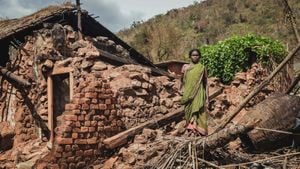Prime Minister Narendra Modi has touched down in Rio de Janeiro, Brazil, to take part in the 19th G20 Summit, which is being held on November 18 and 19, 2024. Modi’s visit marks the second leg of his trip, following his official engagements with Nigerian President Bola Ahmed Tinubu. While there, he focused on deepening ties across sectors such as technology, health, defense, and education with the Nigerian government.
Upon his arrival, PM Modi received a warm welcome from the Indian community, who greeted him at the airport with chanting and vibrant displays of Indian culture, including traditional folk dances and songs. Sharing his gratitude on X, formerly Twitter, Modi expressed how he felt “deeply touched by the warm and lively welcome from the Indian community,” emphasizing the affection shared between India and its diaspora across the globe.
This year's G20 Summit, hosted by Brazil, holds significant importance as it is taking place against the backdrop of complex geopolitical dynamics, particularly the increasing tensions stemming from conflicts like the Russia-Ukraine war and the Israel-Hamas crisis. Modi's agenda includes advocating for the Global South and pushing for issues like hunger eradication and climate actions.
During the G20, Modi is expected to continue India's legacy established during its presidency last year, where substantive progress was made to integrate the priorities of the Global South within the international discourse. With Brazil's leadership, which builds upon India’s previous efforts, Modi will address global challenges and articulate India’s perspectives on pressing issues at the summit.
The summit's agenda prominently features Brazil’s plans, announced by President Luiz Ignácio Lula da Silva, to launch the "Global Alliance Against Hunger and Poverty." This initiative aims to support the 733 million people worldwide currently grappling with hunger. Modi will likely reinforce India’s previous advocacy for agricultural reforms and food security measures, aligning with Brazil's focus on its agricultural strengths to combat both hunger and socio-economic inequality.
Climate change is another hot topic on the agenda, and Brazil’s president is poised to spearhead discussions on sustainable financing mechanisms and the importance of preserving the Amazon rainforest, which has significant global environmental relevance. Modi's administration has previously laid groundwork on climate finance and adaptation strategies through multilateral development bank reforms, enhancing global cooperation for environmental sustainability.
Digital innovation is also set to be highlighted as both India and Brazil share common ground on leveraging technological advancements to drive financial inclusion. India’s Unified Payments Interface (UPI) and Brazil’s Pix platform are recognized examples of how digital public infrastructure can empower citizens financially. The two nations may collaborate on addressing global challenges surrounding data privacy and cybersecurity as part of these discussions.
Reforms of international financial institutions are predicted to take center stage too. Modi has long championed improved governance frameworks for multilateral development banks, emphasizing the need for enhanced representation of developing economies, especially as the summit transitions to host South Africa’s leadership next year. This sequential leadership structure among developing nations is seen as pivotal for future global policy shaping.
Modi’s presence at the summit is more than symbolic as it positions India as a key player within the G20 Troika, which also includes Brazil and South Africa. He is expected to engage with multiple world leaders, strengthening bilateral ties. Notable attendees include US President Joe Biden and Chinese leader Xi Jinping, making for possible significant meetings on the sidelines to address various bilateral and multilateral relations.
Aside from the grave discussions surrounding global conflicts and sustainable development, Modi's conversations at the G20 will be framed by the looming presence of Donald Trump, who recently won the US presidential election and is expected to empower his isolationist policies. This transition could reshape the geopolitical climate and challenge global alliances traditionally held among nations.
The first day of the summit has already brought to light the shared burdens and aspirations of world leaders as they grapple with pressing humanitarian concerns and the very real impacts of climate change. Leaders must navigate the fine line between national interests and global responsibilities, with the likelihood of Modi reinforcing the call for cooperative action.
Following the G20 Summit, PM Modi plans to make his way to Georgetown, Guyana, to engage there with the local leaders and the Indian diaspora, marking his first official visit to the country as Prime Minister since 1968. This moment is not only significant for bilateral relations but highlights India’s deepening ties with Caribbean nations.
With discussions underway highlighting such pressing global issues, Modi is set to put forth India’s voices and echo its commitment to social inclusion, international development, and sustainability as the G20 deliberations continue. It is evident this summit will aim to strengthen the commitment to achieving common goals for not only the enhancing the condition of the Global South but for establishing long-term impactful policies for future generations. The anticipated outcomes are significant, providing another opportunity for international alignment amid uncertain geopolitical waters.



